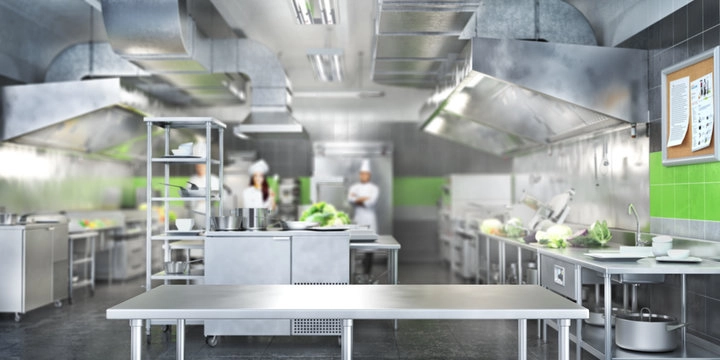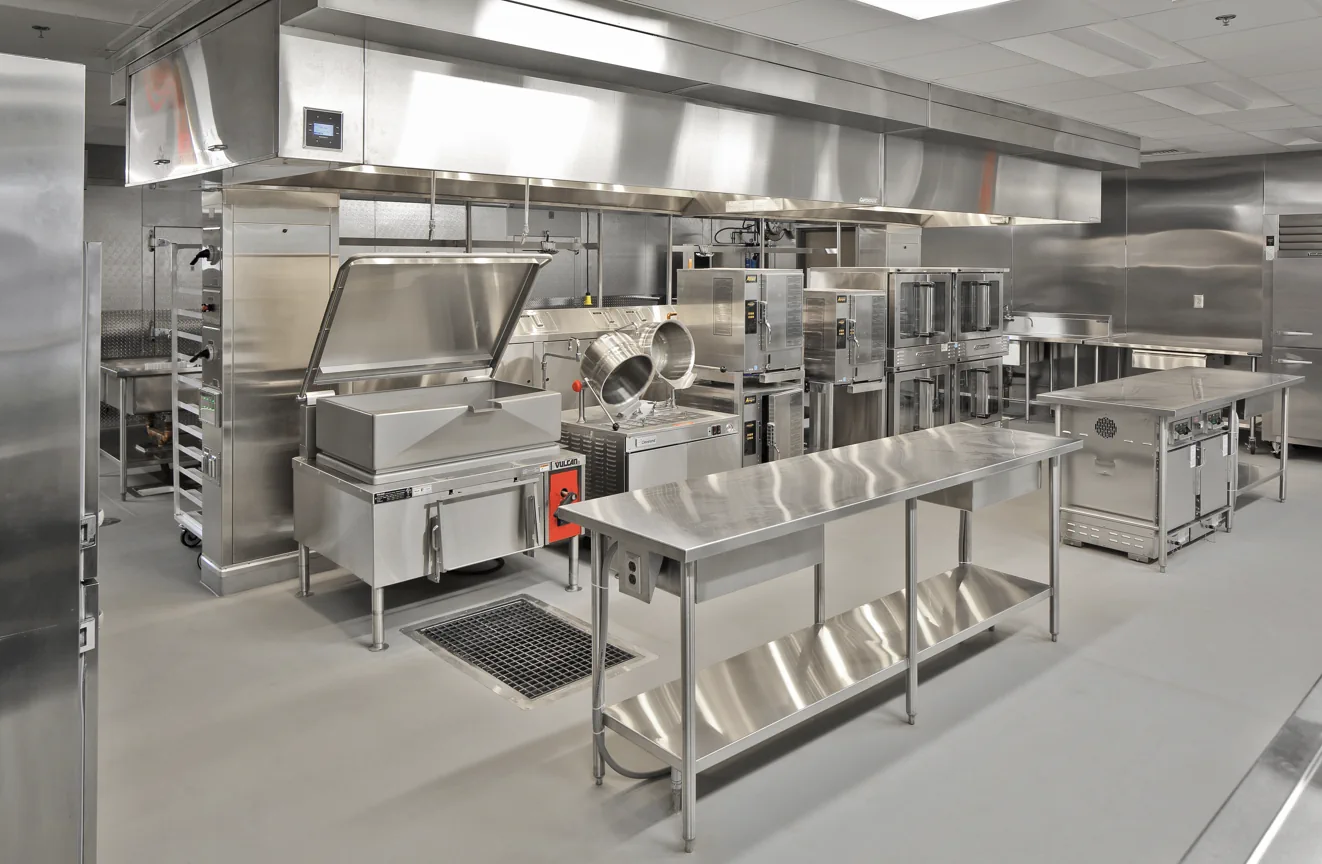The New Era of Kitchen Intelligence
It used to be about heat, now it’s about data. In 2025, hotel and resort kitchens aren’t just cooking – they’re learning. From our projects in Dubai, Nairobi, and Istanbul, we seen how chefs no longer ask for more burners; they ask for better insights. As part of our turnkey kitchen projects, we watched how facility managers shifted priorities: sustainability, connectivity, and lifetime ROI replaced stainless steel thickness as the new status symbol.
Commercial kitchen design in 2025 is not a guesswork. It’s predictive, automated, and energy-aware – and yes, proudly Turkey-built.
Global Shift: What 2025 Means for Kitchen Design
Every five years, hotel kitchen design goes through a quiet revolution. The next one has already started. By 2025, nearly 40% of new hospitality kitchens in Europe are projected to be fully electric, while Asia and the Middle East lead in hybrid energy systems. The demand for low-carbon, modular, AI-ready kitchens has tripled since 2022.
In a 2025-ready layout, designers integrate ventilation, power, and workflow digitally before the first wall is built. No more reactive design changes – every socket, every hood, every induction top is data-mapped. Istanbul-built factories now supply modular units with pre-coded sensors for maintenance alerts. That means fewer breakdowns and better uptime – saving operators up to $18,000 per year in service downtime.
Automation & AI Integration in Hotel Kitchens
The buzzword isn’t just automation; it’s integration. In a Nairobi resort kitchen project, we integrated AI-assisted hood systems that adjust suction based on humidity and temperature, cutting energy use by 22%. Chefs love it because it’s silent; owners love it because it saves money.
AI-powered kitchen systems track oven loads, water consumption, and waste bins. Predictive maintenance dashboards alert the chef before a fryer malfunctions. It’s like having a digital sous-chef who never sleeps. Turkish manufacturers now export AI-compatible gas and electric ranges that sync with hotel management software, bridging kitchen operations with guest experience data.
Human error is still there, we all make it. But now, technology helps cover those small gaps that used to cost hours.
Sustainability and Energy Transition
Sustainability in 2025 isn’t a marketing term; it’s an engineering baseline. From Accra to Amsterdam, hotel developers require full HACCP and LEED compliance in every specification. Turkey-built kitchens meet those needs with AISI 304-grade stainless steel, eco-insulated refrigeration, and low-emission combustion systems.
In a Kigali central kitchen, shifting from gas to induction saved 28% on annual energy costs and reduced ambient heat by 30%. The chefs literally sweat less. Meanwhile, Istanbul-based suppliers now offer pre-insulated ducting and water-saving dishwashing tunnels that cut water use by up to 40% per cycle.
Factories that once focused on steel polishing now invest in carbon tracking. “How green is your kitchen?” is no longer a side question – it’s part of the bid.
Data-Driven Kitchens: The Rise of Predictive Analytics
In 2025, kitchens will generate more data than ever. Each hood, fryer, and oven now sends live performance data to cloud dashboards. Istanbul-based factories export control panels with embedded IoT chips that track humidity, gas flow, and fan speed in real time. Predictive analytics helps facility managers plan maintenance before failures happen — cutting downtime by up to 35%. Data isn’t just collected; it’s acted upon. That’s what separates smart kitchens from digital ones.

Circular Design & Material ReUse
The future kitchen doesn’t just save energy; it saves materials. Turkish manufacturers now reclaim up to 65% of stainless steel offcuts during production. Projects in Europe are already requesting carbon footprint documentation for every panel. Istanbul’s circular production model reduces raw steel waste by over 40 tons per year, setting a new sustainability benchmark for the hospitality industry.
Human-Centric Design: The Chef’s Perspective
Technology won’t replace chefs – but it will redesign their workflow. 2025 kitchens bring ergonomics, light, and visibility into the heart of the plan. In Doha, one executive chef said, “I don’t just want faster cooking; I want a kitchen that feels alive.” That feedback changed how we positioned prep tables and how Turkish engineers adjusted hood heights by just 10 cm – small difference, big impact.
Procurement managers now collaborate earlier, ensuring that every equipment line-up meets both chef comfort and MEP feasibility. Contractors and consultants no longer work in silos. Everyone joins the same BIM model. The result? 15% faster installation, fewer reworks, and happier chefs.
Turkey-Made Advantage in Global Markets
By 2025, Turkey stands at the intersection of European precision and Middle Eastern adaptability. Factory-direct suppliers from Istanbul provide certified solutions for Africa, Asia, and Europe with 30–50% faster lead times than EU competitors. This isn’t just about cost — it’s about control.
A typical hotel project in Mauritius that used to import from Italy in 12 weeks now receives full kitchen lines from Istanbul in 5 weeks, pre-wired and tested. That alone saves about $25,000 in on-site installation and rework costs. Turkish engineering is no longer seen as an alternative; it’s the benchmark for durability and customization.
From energy-efficient combi ovens to modular cold rooms, Made in Turkey defines the smart kitchen ecosystem of 2025.
Challenges Ahead: What Designers Must Prepare For
Every revolution brings its own challenges. As commercial kitchen design gets smarter, coordination becomes critical. Cybersecurity for connected kitchen systems is an emerging issue. AI systems must comply with data privacy rules – even for temperature logs.
Another challenge: balancing sustainability with cost. Not every hotel has the budget for AI-assisted systems, especially in developing markets. The future will belong to flexible suppliers who can scale technology without inflating budgets. Turkish manufacturers are already working on adaptive control modules that retrofit to older systems — bridging innovation with affordability.
And of course, human resistance remains. Some chefs just like the sound of a gas flame.
FAQ – Future of Commercial Kitchen Design (2025)
1. What will be the biggest trend in commercial kitchen design in 2025?
Integration of AI-driven control systems and sustainability-focused layouts.
2. Will automation replace chefs in hotel kitchens?
No. Automation will assist chefs, improving consistency, safety, and energy management.
3. Are Turkey-built kitchens ready for future compliance?
Yes. Turkish manufacturers already export CE, HACCP, and ISO-certified systems that align with 2025 standards.
4. What ROI can hotel owners expect from smart kitchen upgrades?
Average ROI is 18–24 months, driven by lower energy bills and reduced maintenance downtime.
5. How can contractors prepare for the future of kitchen design?
By adopting BIM-based coordination early and collaborating with turnkey kitchen suppliers who understand MEP integration.
